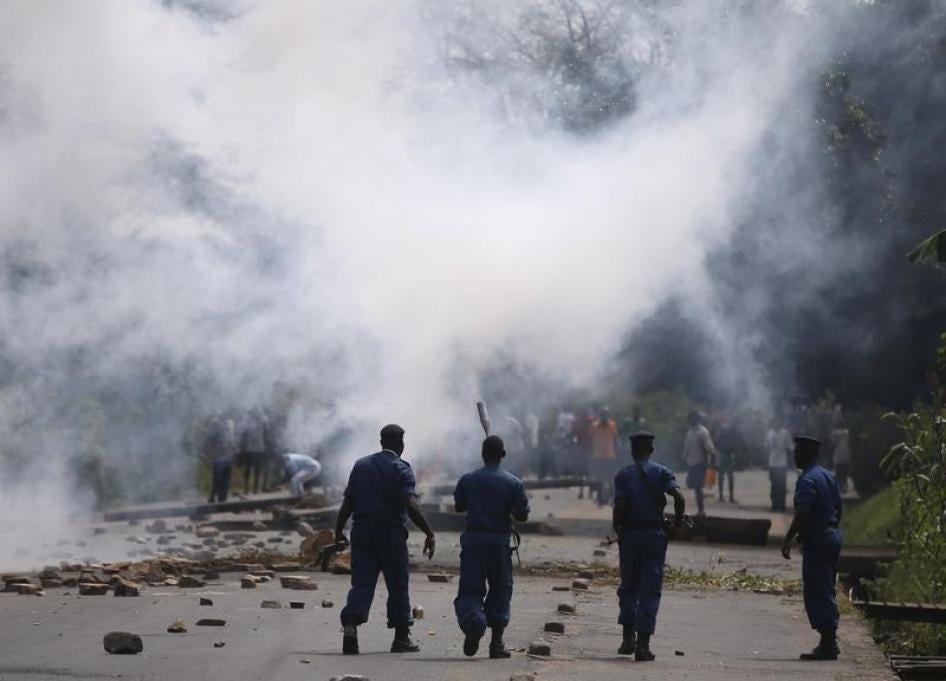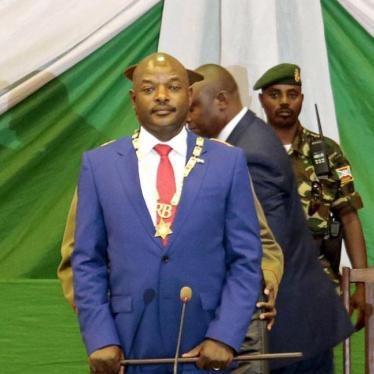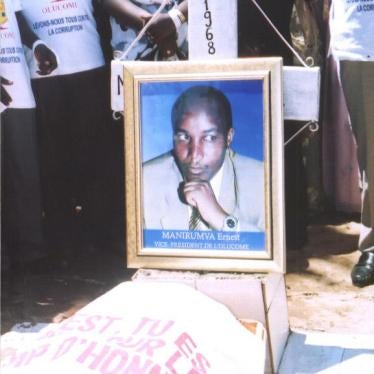In Mid-April an audio recording made the rounds on Burundian social media. In it, a speaker described as a senior police officer delivered a chilling message directed at the government’s political opponents: “If you want to disrupt security, I’ll finish with you there, and if you’re with your wife and children, you’ll go together.” If authentic, the threats aimed at Burundi’s new opposition party members, the Congrès National pour la Liberté (National Congress for Freedom, CNL), would demonstrate disturbing disregard for the rule of law.
Four years after a widespread human rights crisis began in Burundi, this is becoming the norm. Since February, when the CNL was registered, we have received dozens of allegations of arrests, beatings, intimidation and disappearances of members of the new party by members of the national intelligence services, the police, and the Imbonerakure, the youth league associated with the ruling party.
The crisis began on April 25, 2015. That day, the Conseil national pour la défense de la démocratie-Forces de défense de la démocratie (National Council for the Defense of Democracy-Forces for the Defense of Democracy, CNDD-FDD, the ruling party) announced that, despite the fact that he was completing his second term in office, President Pierre Nkurunziza would be its candidate in the July 2015 elections. The controversial decision triggered widespread demonstrations in the capital, Bujumbura. Authorities responded by cracking down on activists, journalists, and demonstrators, and Nkurunziza was re-elected for a third term amid widespread human rights violations in a climate of fear.
From then on, the repression by the national intelligence officials and CNDD-FDD youths became more entrenched. Anyone suspected of opposing the ruling party became a target. Fast-forward four years, and the outlook is grim, as the 2020 presidential election is around the corner. Although the repression is not as visible as in the early days, it is just as brutal and it is taking place with impunity.
The opposition leader Agathon Rwasa created the new party after a May 2018 constitutional referendum that allowed the president to extend his time in office for a good many years. The vote took place in a context of escalating violence and intimidation against political opponents.
One police officer in Bujumbura recently told us over the phone that when local administrative officials identify supporters of the CNL, they are rapidly arrested and accused of participating in “illegal” meetings. According to him, members of the Imbonerakure are orchestrating these arrests, and “they are the ones judicial authorities listen to.” The daily reports published by local monitoring groups suggest this is a widespread practice.
The basic pillars of the rule of law – including a justice system that can operate without political interference – are under severe threat in Burundi.
Lawyers and judges repeatedly speak about the CNDD-FDD officials’ influence over the judiciary at the local, provincial, and national levels. A judge we interviewed said that in politically sensitive cases, when people are accused of threatening state security, the instructions are clear, “There will never be a favorable outcome for the suspect.”
Human rights defenders have either fled or face intense pressure inside the country. A year ago, a leading activist, Germain Rukuki, was sentenced to 32 years in prison for “rebellion,” among other charges. He was prosecuted in relation to his work with the now-banned anti-torture organization ACAT-Burundi. His appeal, scheduled for April 25, after months of delays, has been postponed indefinitely. He therefore remains in detention, uncertain about his future.
The statements we are receiving from people in Burundi reflect a deep-seated fear of the ruling party and the Imbonerakure. Burundians have expressed growing frustration at the increasing economic burden of the crisis and the forced contributions being collected, some to fund the 2020 election. A year ahead of the vote, impunity will likely fuel more violence and repression against political opponents.
The abuse in Burundi is taking place largely in the dark. The government is doing everything it can to hide the truth by silencing dissent.
The African Union (AU) needs to take responsibility for finding a solution to the human rights situation in the country. Its human rights observers have been in the country since 2016 with an unclear working agreement, and none of their reports have been made public. With the UN human rights office and independent civil society and media now forced out, the AU observers are the only external observer mission – albeit stunted – with access to Burundi. With an escalation of the crisis looming, the AU should ensure the truth comes out about the rights violations in Burundi and take further action to address the situation before 2020.










